

Call it the tale of two pension crises. In June, the Los Angeles Times’ business pages looked at the looming retirement savings disaster caused by the nearly 40-year transition from employer-sponsored defined-benefit pensions to individual 401(k) plans — a sea change in retirement insecurity, it noted, that “has been a failure for all but the wealthiest Americans.”
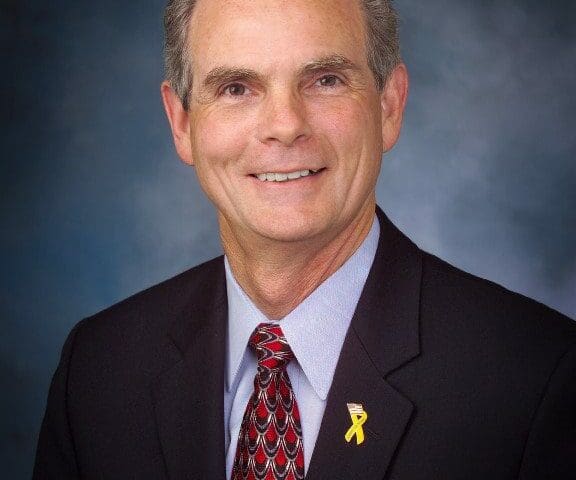

Chuck Reed today declined to address the findings of a Capital & Main poll that showed weak support for two Reed-created ballot initiatives aimed at reducing pension benefits for California’s public employees. If either measure receives the necessary number of petition signatures to be placed on the 2016 ballot, it will face fierce opposition from organized labor.
The poll, conducted by David Binder Research, was released yesterday and showed that if an election were held today, the two measures would win between 40 and 42 percent of the vote. The survey sampled 500 likely voters and has an error margin of plus or minus 4.4 percent.
“I never make statements based on other people’s polling,” Reed told Capital & Main. “Especially in a political environment. We’ll make our decisions based on our own polling.”
Drafted by Reed, a former Democratic San Jose Mayor, and former Republican San Diego City Councilman Carl DeMaio,
» Read more about: Chuck Reed: No Comment on Weak Ballot Polling Numbers »


A pair of potential ballot initiatives written to overhaul California’s public pensions could face a rough road, according to a new poll.
The results from a Capital & Main-David Binder Research poll of 500 likely voters shows that if the election were held today, the numbers of those voting for the measures and those against them appear to be dead even. Those numbers are not what pension-reduction advocates had hoped for going into the 2016 election cycle.
Drafted by former Democratic San Jose Mayor Chuck Reed and former Republican San Diego City Councilman Carl DeMaio, the so-called Voter Empowerment Initiative, and its sibling, the Government Pension Cap Act, received their official summary language (though not their official titles) from the state attorney general last week. Low numbers and lack of support among DeMaio’s fellow Republicans had already forced the pair to abandon a previous effort,
» Read more about: Breaking News: Poll Shows Pension Ballot Measures Already in Trouble »


San Jose Mayor Sam Liccardo has confirmed to Capital & Main that his city is nearing a settlement with its nine non-safety unions over a contentious pension-cutting law that resulted in an exodus of public employees, followed by costly legal actions. Measure B, passed in 2012, sought to reduce pensions for new hires, eliminate extra “bonus” checks to retirees and make it harder to qualify for disability retirement. It also called for veteran workers to either pay much more for their pensions or switch to a pension with reduced benefits.
The two sides appear to be moving closer to a settlement similar to one reached four months ago with police and fire unions.
How close? “Soon,” Liccardo said by telephone. “We don’t [quite] have all the signatures yet.”
Measure B is blamed for a brain drain of San Jose’s top city engineers and technical talent.
The story of Measure B and the damage it left in its wake is of more than academic interest,
» Read more about: Can San Jose Move Past Pension Measure's Toxic Fallout? »
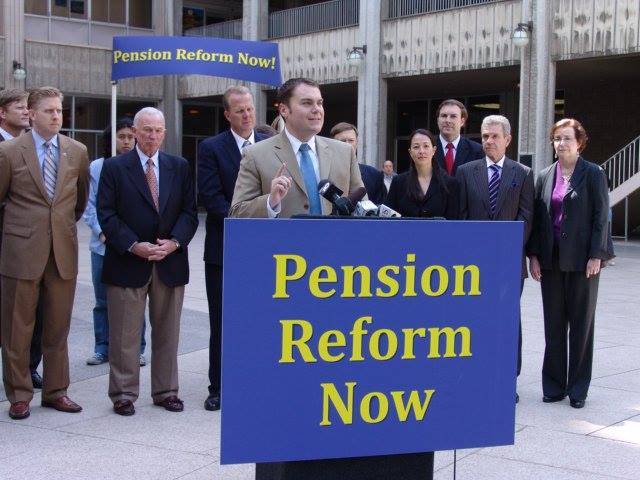
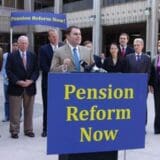
Backers of a proposed statewide ballot measure that would radically change the way wages and pensions of California’s government employees are formulated have begun an email campaign seeking pledges of support for the measure – as well as volunteers to circulate signature petitions when they become available in a few weeks.
The pension activists have 180 days from August 11, the date Attorney General Kamala D. Harris assigned a full title and ballot summary to the measure, in order to qualify it for the November, 2016 election.
Such email campaigns can help an initiative qualify for the state ballot if coupled with other efforts, Mike Madrid of Grassroots Lab, a Sacramento-based public affairs group, told Capital & Main by phone. “But if it is the only thing you are doing the chances for success are slim.”
In ballot-box politics, the bottom line is money.
» Read more about: Leaders of Pension-Cutting Ballot Proposal Look for Supporters Online »


On Tuesday California Attorney General Kamala D. Harris released the full title and summary text for the Public Employees Pension and Retiree Healthcare Benefits Initiative Constitutional Amendment. The title is a mouthful, but the initiative’s wording is just six sentences long.
Its first two lines read: “Eliminates constitutional protections for vested pension and retiree healthcare benefits for current public employees, including those working in K-12 schools, higher education, hospitals and police protection, for future work performed. Adds initiative/referendum powers to Constitution, for determining public employee compensation and retirement benefits.”
Crucially, Harris omits mention of “empowering” voters — a main selling point that had been advertised by former San Jose mayor Chuck Reed, former San Diego City Councilman and Tea Party member Carl DeMaio, and four others. In June this group submitted their proposed ballot initiative to Harris as the Voter Empowerment Act of 2016. Harris’ new title weakens their cause,


On Tuesday, California Attorney General Kamala Harris will release the official title and summary that will appear on the 2016 ballot for former San Jose mayor Chuck Reed’s latest statewide public-sector pension cutting initiative.
That language will finally end speculation on how far Harris will go in describing the sweeping scope of the proposed constitutional amendment. Legal analysts have charged that it contains a hidden trigger aimed at not just slashing pension benefits but annihilating 60 years of state pension law along with the vast retirement systems that together guarantee the retirement promises made to California’s public employees.
Initial clues as to what might appear on the 2016 ballot emerged last week as the first formal responses by state officials to the proposed measure began to trickle in.
The stakes for all Californians in the so-called “Voter Empowerment Act of 2016” couldn’t be higher.
For Reed and his supporters,
» Read more about: Countdown to Disaster: Grim Official Estimates on 2016 Pension Cutting Measure »


When Democratic former San Jose mayor Chuck Reed and Republican ex-San Diego councilmember Carl DeMaio finally unveiled the language for a promised attempt at getting a statewide public pension cutting measure to 2016 voters, the expectation was that Reed II would be a reined-in and more realistically-framed version of Reed I – last year’s failed attempt at undermining the public pension system.
That try for the 2014 ballot was aborted after Attorney General Kamala Harris slapped it with a candid, albeit politically untenable summary that frankly described the proposed constitutional amendment as targeting longstanding legal rights—rights that protect the pensions and retirement health care of the 1.64 million Californians enrolled in the state’s public pension systems.
But even veterans of the state’s public-sector retirement wars were unprepared for the sheer scale of what awaited them this time around.
» Read more about: Measure of Deception: CA Initiative Would Gut Retirement Benefits for Millions »


The newest front in the battle over the retirement security of California’s public employees opened June 4 with the release of the language for a proposed ballot initiative that would rewrite the state’s constitution to virtually outlaw traditional defined-benefit pension plans for future state and municipal workers.
The measure, dubbed “The Voter Empowerment Act of 2016,” would effectively shift all new public employees from the various defined-benefit plans currently in place to 401(k) plans, beginning in 2019. It would then lock those plans in place by adding the burden of direct voter approval on government employers who want to continue offering traditional pensions after 2019.
Also see in this series:
The security offered by defined-benefit retirement plans has been typically used by government employers to compete with the private sector in recruiting quality candidates for public workforces.
» Read more about: New Retirement Ballot Proposal: The Language of Cuts »


No city offers Californians a better example of voter-approved pension-cutting than San Jose. In 2012, then-mayor Chuck Reed, who is the co-author of the new “Voter Empowerment Act of 2016,” persuaded citizens to pass Measure B. Some provisions of the San Jose law were later thrown out by a Santa Clara County Superior Court, but an uneasy atmosphere lingers over this city whose public employees were vilified by Measure B’s supporters. Capital & Main recently discussed the fallout from Measure B and previous budget cuts, with a city firefighter who requested that only his first name be used.
Capital & Main: What do you see as the biggest problem facing the San Jose Fire Department today?
Matt: Don’t get me wrong, I love the department I work for . . . Unfortunately with the budget cuts that our department [has] faced [for] over a decade,
» Read more about: San Jose's Pension-Cutting Legacy: A Firefighter's Story »


On April 10, the libertarian Reason Foundation held its strategic “pension summit” in Sacramento’s Sterling Hotel to reduce government workers’ retirements. A proposed 2016 state ballot measure to cut public employee pensions by shifting them from traditional, defined-benefit pensions to more volatile 401(k)-type retirements took center stage. At that point, the measure was months away from being submitted to the state Attorney General’s office for a title and approval of its wording.
The measure is co-authored by Chuck Reed, the former Democratic mayor of San Jose who successfully pushed a 2012 city pension-cutting ballot initiative, Measure B. Reed headlined the summit, which was open to the media only on an off-the-record basis.
“The political support is the relatively easy part,” Reed told Capital & Main after the summit concluded. “As long as you are solving a problem the public is willing to support it in the form of pension reform.”
But not everyone shares Reed’s optimism.
» Read more about: In Their Own Words: Pension Disrupters Speak »
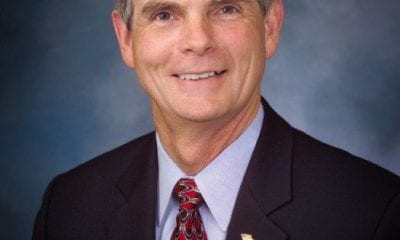

Last month former San Jose mayor Chuck Reed took the first step toward offering a promised draft of a 2016 public pension cutting initiative that, he has hinted, will target the California Public Employees’ Retirement System. CalPERS manages the retirement and health benefits for more than 1.6 million California public employees, retirees and their families. Reed tried to get a pension initiative on the ballot in 2014, only to withdraw the measure when state attorney general Kamala Harris assigned it a ballot description that Reed and his allies believed would hurt their chances with the electorate.
This time, however, Reed could find his campaign in danger from an unexpected source – conservative allies who might be worried that his initiative’s very presence on the ballot will draw huge numbers of liberal and union voters – who would then also vote against conservative candidates running for local and state office.
» Read more about: Pension Cutters' 2016 Ballot Obstacle: Voters »


California pension cutters suffered another setback last week when a state appellate court rejected their claims that ballot language written by Attorney General Kamala Harris showed political bias.
The decision by Sacramento’s 3rd District Court of Appeal “dismissed as moot” San Jose Mayor Chuck Reed’s appeal of a lower court ruling. This effectively leaves in place Sacramento Superior Court Judge Allen Sumner’s March decision that Reed had failed to prove Harris’ ballot summary was misleading.
“We’re not going to get a hearing on the merits,” Reed told Capital & Main. “It shows how difficult it is to try to get through the court system in an election cycle; it means you have to start earlier.”
Legally, the two rulings sound a final death knell for Reed’s contentious statewide campaign to put his self-described Pension Reform Act of 2014 before California voters. In practical terms,
» Read more about: Pension Cutters Lose in Court, Vow 2016 Ballot Bid »
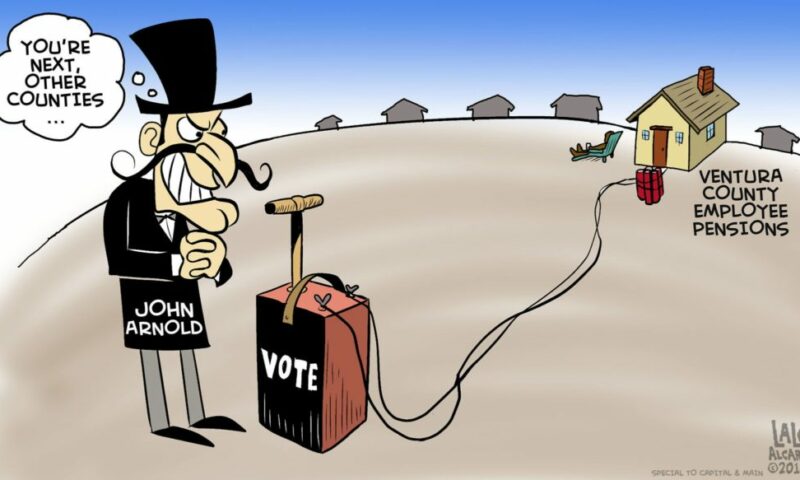

Jon Coupal is nothing if not blunt when he describes one motive behind a Ventura County ballot measure that would replace the “defined benefit” pensions currently enjoyed by county employees and replace them with 401(k)-type plans for all future hires.
“This is meant to be a template for other counties,” Coupal tells Capital & Main. By that, the Howard Jarvis Taxpayers Association’s president means the measure’s conservative and libertarian backers see the “Sustainable Retirement System Initiative” as the newest and most promising weapon in their assault on California’s public employee retirement plans. Having failed to place similar measures on state ballots in 2012 and 2014, a coalition of wealthy individuals, anti-tax activists and government privatizers has seized on an aspect of California law that allows 20 counties to fashion their own public employee retirement policies apart from the CalPERS system that administers such policies for nearly all of the state’s remaining 38 counties.
» Read more about: Domino Effect: Pension Cutters Gamble on a California Ballot Measure »
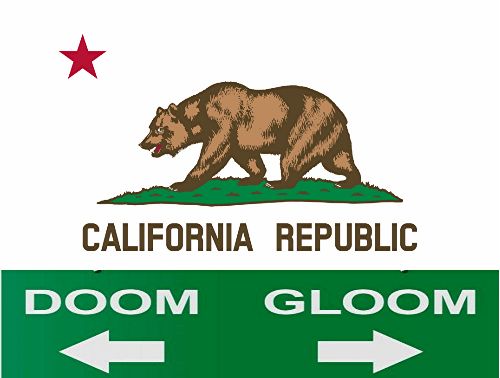

Last week’s announcements about 2013 earnings by California’s largest public pension funds suggest the agencies may be making significant progress in shaking off the lingering after-effects of the 2008 stock market crash.
The California Public Employees’ Retirement System (CalPERS) said it rode a 25 percent run-up in stock prices to post a 16.2 percent gain for its 2013 portfolio — its best showing in a decade. For its part, the California State Teachers’ Retirement System (CalSTRS) reported an impressive 19.1 percent return on its 2013 investments, led by a 28 percent return on its stock holdings.
The announcements undoubtedly came as welcome news to the roughly 1.6 million California government workers and 860,000 public school teachers represented by the systems. Ever since the 2008 global financial meltdown, their pensions have been in the crosshairs of fiscal conservatives and anti-public pension activists who wish to see the employees’


Late Monday afternoon California Attorney General Kamala Harris released the state’s official title and summary for the ballot initiative promoted by San Jose Mayor Chuck Reed and others to reduce the retirement benefits of state and municipal workers. Harris’ wording had been anxiously awaited by Reed and his colleagues. In 2012 a different group of pension-cutters abandoned their measure, according to the Sacramento Bee, after they tested Harris’ summary and found it would make their measure radioactive at the polls.
Reed had called his proposal the Pension Reform Act of 2014 and, no doubt, had his fingers crossed that it would appear that way on a future ballot. If so, he was in for a disappointment, as the attorney general rebranded the measure as the less lyrical Public Employees Pension and Retiree Healthcare Benefits Initiative Constitutional Amendment. To the pension-cutters’ further chagrin, Harris’ description placed teachers,
» Read more about: Can Chuck Reed’s Pension-Cutting Campaign Get Off the Ground? »


In 2011, the University of California, Berkeley Center for Labor Research and Education put out a study that should have sparked mass rallies up and down the Golden State. The report found that nearly half of California workers will retire in or near poverty. In other words, a state once synonymous with the American Dream of economic opportunity and security is on a path to become a purgatory for millions of seniors.
It’s hard to square this alarming fact with the revelation last month that a group of mostly ultra-conservative electeds and activists will try to place a statewide measure on the 2014 ballot that would slash the pensions of government workers. The group, headed by San Jose Mayor Chuck Reed, includes Texas billionaire John Arnold, who has made “pension reform” a personal crusade.
The initiative would not only cut the retirement benefits of future public sector workers,
» Read more about: What State Pension Slashers Really Want »
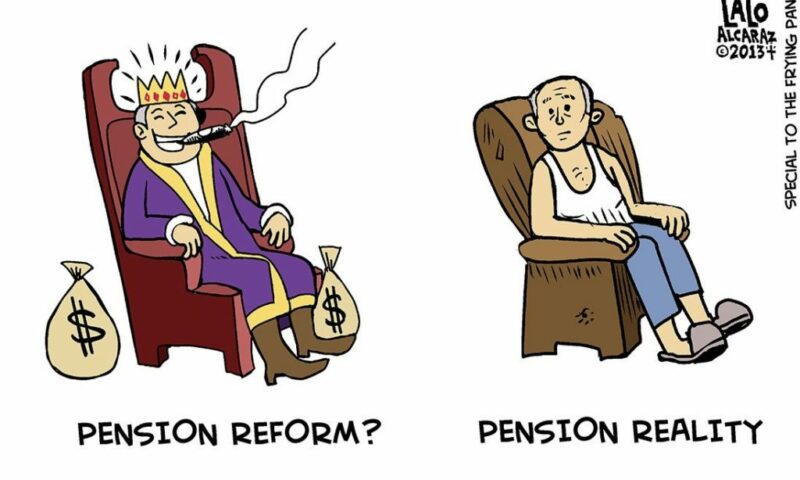
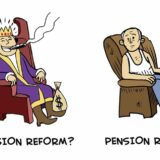
It’s official: America has entered a retirement crisis. Or, as Forbes understatedly put it, “the greatest retirement crisis in the history of the world.”
And, while the causes are manifold — the demographic bulge of baby boomers leaving the fulltime workforce; greater worker longevity; the disastrous, 30-year shift from traditional defined benefit pensions to costly 401(k)-style plans — most experts agree that the national retirement implosion has gone critical, with an estimated 75 percent of Americans who are nearing retirement age having less than $27,000 in their retirement accounts.
Even John C. Bogle, the founder of the $2 trillion mutual fund and 401(k) behemoth Vanguard Group, recently admitted that the system of retirement plans that rely on 401(k)s is broken.
“[401(k)s were] designed as a thrift plan, and it doesn’t work as a retirement plan,” Bogle declared.
So it is with some irony that a Texas hedge fund billionaire/former Enron trader and a politically ambitious Northern California mayor have teamed up to cripple one of the few parts of the retirement story that still works — California’s public-sector pension system.
» Read more about: My Body Isn’t 40 Anymore: Three Faces of Retirement »
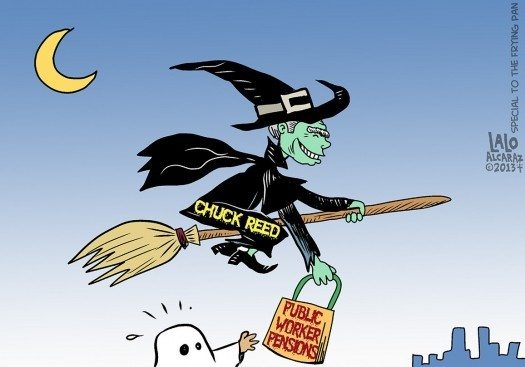

Last week San Jose Mayor Chuck Reed delivered his usual speech about the benefits of slashing the retirement benefits of his city’s public employees – and why he is now pushing for a statewide ballot measure that could dramatically change the lives of hundreds of thousands of Californians. Reed’s initiative – which he characterizes as a bipartisan effort and which hasn’t yet qualified for the 2014 ballot — would allow the state and local governments to reduce retirement benefits for current employees for the years of work they perform after the measure’s changes go into effect. What was not usual about Reed’s speech was its setting: The Roosevelt Hotel in New York City, 3,000 miles from California.
Reed was a keynote speaker at a “Save Our Cities” conference sponsored by the Manhattan Institute, a conservative think tank co-founded by Ronald Reagan’s CIA director, William Casey.
» Read more about: Pension Cutters: Bipartisan Slogans, Right-Wing Money »


The latest chapter in the efforts to dismantle California’s public-sector retirement system was officially opened Tuesday when San Jose Mayor Chuck Reed submitted paperwork that begins the process of qualifying his latest pension initiative for next year’s statewide ballot.
The filing brings to a climax weeks of speculation about the timing of the proposed law after Frying Pan News first confirmed rumors of its existence when Gary Cohn published a leaked draft version last month and when we reported Reed’s remarks, delivered before a Hoover Institution conference on pensions, that indicated he was uncertain whether he would file for the 2014 or 2016 ballot. Now Reed is certain: It’s 2014 or never.
Called the Pension Reform Act of 2014, the measure seeks to rewrite California’s constitution in order to bypass its current guarantees of public pension rights. If passed by voters,
» Read more about: There Will Be Blood: Chuck Reed Files Pension-Cutting Ballot Initiative »